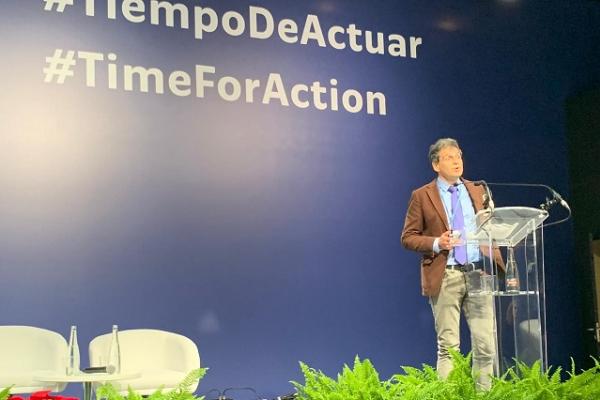Dr. Carmelo León, director of the TIDES University Institute of the ULPGC and coordinator of the SOCLIMPACT project financed by the EU through the H2020 call, was present at the Official Conference of the Parties (COP25). He participated in the event entitled “Climate Action in Travel and Tourism” organized by the World Travel & Tourism Council (WTTC) and the COP.
The event, which was attended by personalities of the highest level in Climate Change issues, began with the intervention of the Executive Secretary for Climate Change of the United Nations, Patricia Espinosa and was chaired by Gloria Guevara, President and Executive Director of the WTTC. The interventions were led by representatives of the tourism industry (Iberia, Europamundo Vacaciones, CLIA) as well as the environmental sector (GSD, IETA, Acciona) and moderated by Professor Geoffrey Lipman, Co-Founder of the SUNx Program – Strong Universal Network.
On this occasion, Dr. Carmelo León participated as a “keynote” (setting the scientific basis for the debate) and as a speaker pointing out the role of the importance of the SOCLIMPACT project in facing the challenges that Climate Change represents for tourism.
The Director of TIDES used examples from the Canarian economy, such as the recent fires in Gran Canaria and how this event affects future decisions of tourists when choosing a destination, the economic losses involved in terms of renovation costs, or those costs related to the deterioration of the image of the destination and the loss of value of the tourist experience.
The central theme of the event revolved around the importance that travel and tourism has for the economy and for society worldwide, which has allowed millions of people to discover new destinations, meet with family and friends and generate thousands of jobs, especially in developed countries, revealing this sector as a true global economic power.
The travel and tourism industry accounted for 10.4% of global GDP in 2018, making it the leading industry for the economy, trade, employment and development worldwide. However, it is also a sector that contributes about 8% of global greenhouse gas emissions.
The World Travel and Tourism Council has set a target for 2050 for the sector to be climate neutral, a challenge that many companies are already demonstrating by reducing the impacts of their activities. The session focused on analyzing what is needed and what travel and tourism companies are doing to achieve this goal.
The organization signed up last year to the United Nations’ “Climate Neutral Now” initiative with a commitment to measure its greenhouse gas emissions, reduce what it can and offset the rest, while promoting the same climate-friendly regime to its 15 members worldwide.
The ravages of climate change soon will require all of us, government and corporations especially, to do things differently, Espinosa said, citing a recent open letter from the heads of major financial institutions: “If some companies and industries do not adjust, they will simply cease to exist.
Among the event’s opening remarks, President and CEO Gloria Guevara said the message is clear: “The climate and the environment are top priorities. She also noted that we need to find a way to offer “environmentally friendly” travel by simply saying, “Not traveling will help the environment and would be very irresponsible” as it would lead to more poverty, more unemployment, and ultimately more damage to the environment.
Source: La Provincia.

